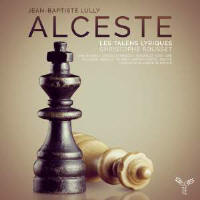Texte paru dans: / Appeared in: Code-barres / Barcode : 3149028128239 |
|
 |
Outil de traduction (Très approximatif) |
|
Reviewer:
Richard Wigmore
I wouldn’t rank Alceste as highly as Atys or – Lully’s masterpiece – Armide. The little triple-time solos that grow out of the stylised recitative tend to have a wan, predictable charm; and Lully’s harmonic imagination is more constricted than in the best of his later operas. But there is plenty to savour, whether in the many instrumental numbers, plaintive, amorous or bellicose, the delightful comic scene in Act 4 for the mercenary Charon, happy to fleece even the dead, or – the emotional heart of the opera – the poignant pompe funèbre for Alceste in Act 3, culminating in a choral chaconne that sounds distinctly Purcellian to British ears. Until now Alceste has been decently served by the live recording from Jean-Claude Malgoire (Disques Montaigne, 4/93). But this new version, recorded in the Salle Gaveau, Paris, after performances at the Beaune Festival, eclipses it in polish, theatrical verve, casting and sound quality. Few if any conductors match Christophe Rousset’s understanding of Lullian style and rhetoric; and few could complain that he tweaks the sparse orchestration here and there when the effect is so theatrically vivid. His pacing and inflecting of the music seems unerring, not least in his graceful shaping of cadences and his sensitivity to the vein of pastoral nostalgia in the final divertissement (Malgoire and his forces sound altogether blunter here). Chorus and orchestra, so well versed in the idiom, are invariably vital, and Rousset draws compelling performances from his singers, all of whom sound at ease in the tricky-tomaster art of natural French declamation. Even among the non-Francophone singers, diction throughout is a model of clarity and point. In the title-role Judith Van Wanroij, with a touch of metal in her limpid tone, seems ideally cast, bringing a mingled intensity and delicacy of inflection to her moving laments in Acts 2 and 3. Equally good are the plangent and agile high tenor – almost an haute-contre – of Emiliano Gonzalez Toro as her husband Admète, and the sturdy, no-nonsense bass of Edwin Crossley-Mercer as Alcide (aka Hercules), a man without a scintilla of self-doubt who muscles his way into the Underworld, yet finally abandons his designs on Alceste to ensure a happy ending (Louis XIV doubtless saw his own image here). Étienne Bazola’s light baritone is better suited to the wind god Éole than to the subterranean pronouncements of Pluton. But Douglas Williams is splendidly incisive as Alceste’s abductor Lycomède, and, abetted by Rousset, relishes his comic turn as Charon; and Ambroisine Bré brings vocal charm and guile – a touching pathos, too, in the scene of mourning – to the role of Alceste’s flirtatious confidante Céphise, whose amoral, carpe diem philosophy (‘marriage is the death of love’) chimed perfectly with that of the Versailles court. More than Rameau’s, Lully’s heavily stylised tragédies en musique are likely to remain a specialist taste. But it is hard to imagine this music, often delightful, sometimes witty, intermittently touching, coming alive more vividly than it does here. |
|




